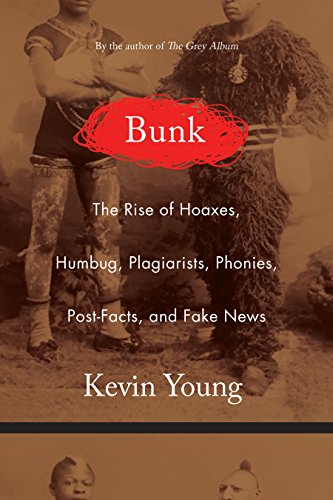Bunk and the History of Hoaxes with KEVIN YOUNG
Before fake news dominated headlines, KEVIN YOUNG was tracking down its roots. His latest book, Bunk: The Rise of Hoaxes, Humbug, Plagiarists, Phonies, Post-Facts, and Fake News, chronicles the racially prejudiced path that brought fake news to where it is to today. Longlisted for the 2017 National Book Award, Bunk dives into hoaxes big and small that permeate American history and the cultural attitudes that drive them. Young joins CAROLE BELL, an assistant professor of Communication Studies at Northeastern University whose research explores the connections between media and politics, for a broad-ranging discussion on the current state and political consequences of fake news. A book signing will follow.
Speakers
Kevin Young is poetry editor for The New Yorker, director of the Schomburg Center for Research in Black Culture at the New York Public Library, and the author of 11 books and poetry collections including The Grey Album: On the Blackness of Blackness, which was a New York Times Notable Book, and Jelly Roll: A Blues, which was a finalist for the National Book Award.
Carole Bell is an assistant professor of Communication Studies and affiliated faculty in Political Science at Northeastern University. Bell’s teaching and research focuses on the intersections of media, politics, public opinion and public policy, with a particular focus on issues of social identity. Her first book, The Politics of Interracial Romance in American Film, is forthcoming from Routledge.
This event is sponsored by Radius at MIT. All Communications Forum events are free and open to the general public.
Award-Winning Poet/Critic KEVIN YOUNG on the History of “Bunk”
Harvard Book Store welcomes award-winning poet and critic KEVIN YOUNG for a discussion of his latest book, Bunk: The Rise of Hoaxes, Humbug, Plagiarists, Phonies, Post-Facts, and Fake News. This event is co-sponsored by Mass Humanities.
This event is free and open to the public!
About Bunk
Bunk traces the history of the hoax as a peculiarly American phenomenon, examining what motivates hucksters and makes the rest of us so gullible. Disturbingly, Young finds that fakery is woven from stereotype and suspicion, race being the most insidious American hoax of all. He chronicles how Barnum came to fame by displaying figures like Joice Heth, a black woman whom he pretended was the 161-year-old nursemaid to George Washington, and What Is It?, an African American man Barnum professed was a newly discovered missing link in evolution.
Bunk then turns to the hoaxing of history and the ways that forgers, plagiarists, and journalistic fakers invent backstories and falsehoods to sell us lies about themselves and about the world in our own time, from pretend Native Americans Grey Owl and Nasdijj to the deadly imposture of Clark Rockefeller, from the made-up memoirs of James Frey to the identity theft of Rachel Dolezal. In this brilliant and timely work, Young asks what it means to live in a post-factual world of “truthiness” where everything is up for interpretation and everyone is subject to a pervasive cynicism that damages our ideas of reality, fact, and art.



